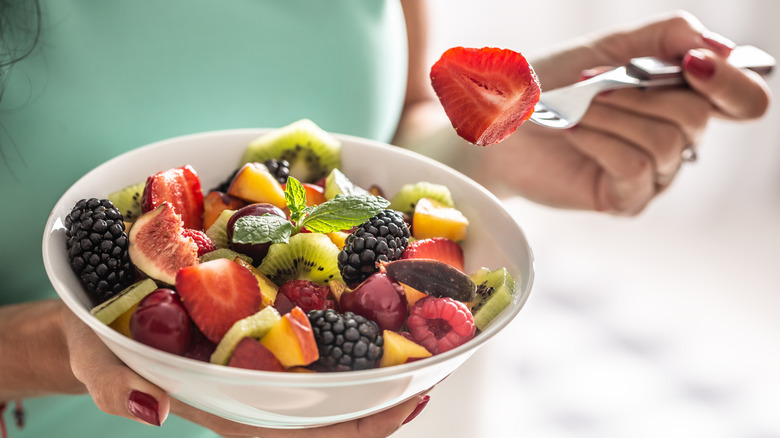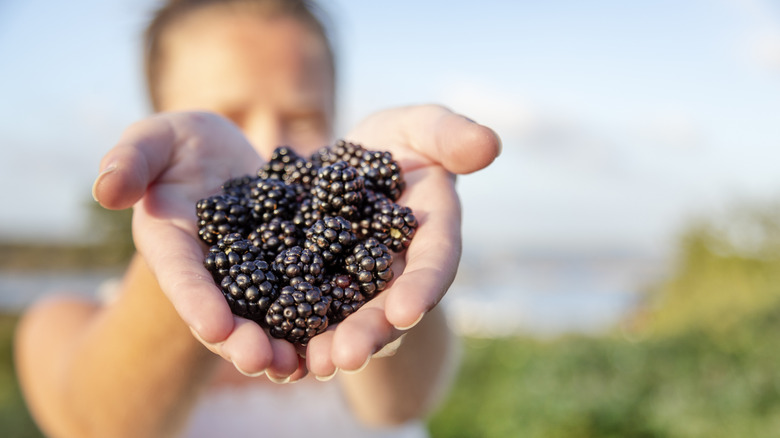
Most berries offer a delightful combination of sweet and tart flavors, making them perfect as a topping for yogurt or a scoop of vanilla ice cream. While frozen berries are readily available throughout the year, the summer season brings an abundance of fresh ones. (Here’s what happens to your body when you eat berries every day.)
Strawberries and blueberries often get the spotlight in fruit cups, but don’t overlook blackberries. A single cup provides over 7 grams of fiber for just 62 calories, making them an excellent choice for those mindful of their carb intake (blackberries also contain protein). They are a rich source of vitamin C, supplying approximately 34% of your daily requirement. Blackberries also contain B vitamins, vitamin E, and essential electrolytes such as calcium, magnesium, and potassium. Plus, they are naturally low in sodium.
The deep purple-black hue of blackberries indicates the presence of powerful antioxidants. Blackberries are particularly rich in anthocyanins, compounds that combat inflammation and protect your cells from damage. Incorporating more of them into your diet may help reduce the risk of heart disease, certain cancers, and diabetes.
The disease-fighting compounds in blackberries

Before the advent of modern diabetes medications, plant-based compounds were used to manage the condition. According to a 2023 review in the International Journal of Molecular Sciences, quercetin can enhance the body’s production and response to insulin. It may also stabilize blood sugar levels by reducing glucose absorption in the gut and facilitating glucose uptake into muscles and other tissues for energy use.
DNA damage can lead to gene mutations, causing cells to grow uncontrollably. The phenolic compounds in blackberries may help prevent cancer by minimizing DNA damage. These compounds may also inhibit the formation of new blood vessels that supply tumors, limiting their capacity to spread. The anthocyanins in blackberries may aid in detoxifying carcinogens and potentially inhibit an enzyme that cancer cells need to continue dividing. (Read about other ways blackberries can benefit your health.)
Blackberries may also promote heart health in several ways. They contain ferulic acid, a compound associated with reduced inflammation, lower LDL (“bad”) cholesterol and triglyceride levels, and increased HDL (“good”) cholesterol. Flavonoids present in blackberries and other fruits can reduce blood clot formation, protect platelets from oxidative stress, and boost nitric oxide production, enhancing blood flow. A 2020 review in Phytotherapy Research indicated that berry compounds might help lower blood pressure by reducing the activity of angiotensin-converting enzyme (ACE), a key regulator of blood pressure.
Fresh or frozen blackberries have the most antioxidants

If you’re looking to incorporate more blackberries into your meals, spring and summer are ideal for finding them fresh. Frozen blackberries are available all year and retain the same powerful antioxidants as fresh ones. However, blackberry jam, while tasty on toast or pancakes, lacks the same benefits. Much of the antioxidant content is lost during processing, particularly due to added sugars and syrups.
Blackberries are easy to integrate into foods you already enjoy. Add frozen berries to your morning smoothie for a fiber-rich breakfast that keeps you satiated longer. Alternatively, create a simple fruit salad with blackberries, grapes, apples, and walnuts, finished with a drizzle of honey, a sprinkle of cinnamon, and a squeeze of fresh orange juice. They’re not just for breakfast. Simmer blackberries with balsamic vinegar and maple syrup for a flavorful glaze over heart-healthy salmon. For a refreshing beverage, blend blackberries with honey, lime juice, and lemon sparkling water for a fruity mocktail that feels indulgent.
“`




